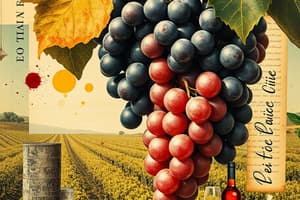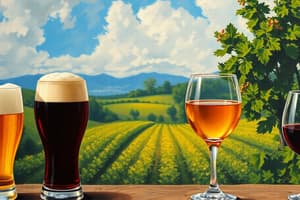Podcast
Questions and Answers
La primera etapa para entender los vinos es comprender el proceso de cómo cobran ______.
La primera etapa para entender los vinos es comprender el proceso de cómo cobran ______.
vida
Los vinos blancos suelen pasar por un proceso de fermentación más ______ debido a sus niveles de acidez más bajos en comparación con los tintos.
Los vinos blancos suelen pasar por un proceso de fermentación más ______ debido a sus niveles de acidez más bajos en comparación con los tintos.
rápido
Durante el período de ______, el vino puede madurar en barricas de roble o tanques de acero inoxidable según el perfil de sabor deseado.
Durante el período de ______, el vino puede madurar en barricas de roble o tanques de acero inoxidable según el perfil de sabor deseado.
envejecimiento
Las uvas se cosechan y se llevan a las bodegas para el ______.
Las uvas se cosechan y se llevan a las bodegas para el ______.
Los vinos rojos necesitan tiempos de fermentación más largos para extraer más color y sabores de la ______, que se elimina durante la producción de vino blanco.
Los vinos rojos necesitan tiempos de fermentación más largos para extraer más color y sabores de la ______, que se elimina durante la producción de vino blanco.
Algunos vinos incluso pueden ser __________ en botellas antes de ser lanzados al mercado
Algunos vinos incluso pueden ser __________ en botellas antes de ser lanzados al mercado
Los vinos blancos se elaboran con uvas blancas y suelen tener cuerpos más ligeros, mayor acidez y bajo contenido de __________
Los vinos blancos se elaboran con uvas blancas y suelen tener cuerpos más ligeros, mayor acidez y bajo contenido de __________
La región de _____ en California es conocida por sus vinos de alta calidad
La región de _____ en California es conocida por sus vinos de alta calidad
Al catar vinos, es importante evaluar su apariencia, olor, sabor y estructura ________
Al catar vinos, es importante evaluar su apariencia, olor, sabor y estructura ________
Los vinos _______ son fortalecidos con licores como el brandy, lo que les otorga sabores distintivos y un mayor contenido de alcohol
Los vinos _______ son fortalecidos con licores como el brandy, lo que les otorga sabores distintivos y un mayor contenido de alcohol
Flashcards are hidden until you start studying
Study Notes
Vinos: Exploring Wine Production, Types, Regions, and Tasting
Wine is a beloved beverage enjoyed by millions around the world. Its history spans centuries, with various cultures developing unique methods of production and consumption. From the lush vineyards of Italy and France to the robust wines of California and Australia, let's delve into the fascinating world of 'vinos'.
Wine Production
The first step in understanding vinos is to grasp the process of how they come to life. Wine starts its journey in the vineyard where grapes grow under specific conditions—temperature, sunlight exposure, soil type, etc. Once ripe, the grapes are harvested and taken to wineries for processing. Here, they go through different stages such as pressing, fermenting, aging, blending, and bottling.
Fermentation is crucial because it transforms sugars in grape juice into alcohol. White wine varieties usually undergo a faster fermentation process due to their lower acidity levels compared to reds. Red wines need longer fermentation times to extract more color and flavors from the skin, which is removed during white wine production.
During the aging period, wine can mature in oak barrels or stainless steel tanks depending on the desired taste profile. Barrel aging imparts aromas and flavors from the wood while also allowing oxidation to take place. Stainless steel tanks offer a cleaner, fresher taste with less oxygen interaction. Some wines might even be aged in bottles before being released onto the market.
Types of Wine
There are several types of wines categorized based on factors like the variety of grapes used, the region they come from, how long they age, or their residual sugar content. Common types include:
-
White: These are made using white grapes and often have lighter bodies, higher acidity, and low tannin content.
-
Red: Produced from red grapes, these wines typically exhibit deeper colors, bolder tastes, more prominent tannins, and lower acidity.
-
Rosé: Also known as pink wine, rosés result from short maceration periods where red grape skins remain in contact with the juice just long enough to give them their distinctive shade. They display medium body characteristics between whites and reds.
-
Sparkling: Champagne, Cava, Prosecco, etc., fall under this category. They come in both still and sparkling variations and are generally combined with some sweetness to balance out the high acidity.
-
Fortified: Port, Sherry, Madeira, Marsala, and Vermouth are examples of fortified wines. These are strengthened with spirits like brandy, giving them distinct flavors and higher alcohol contents.
Wine Regions
Wine regions play a significant role in defining a particular wine's character. Climate, soil composition, altitude, and other environmental factors all contribute to the unique qualities found in each bottle. Some renowned regions include Napa Valley in California, Bordeaux and Burgundy in France, Tuscany in Italy, and Margaret River in Australia. Each of these areas has its own set of microclimates, grape varietals, and winemaking traditions that shape the final product.
Wine Tasting
Tasting wine involves assessing its appearance, smell, taste, and overall structure. When observing the liquid itself, look for clarity, color depth, and any sediment present. Next comes aroma evaluation, where you identify scents related to fruitiness, earthiness, floral notes, or nuances associated with aging. Finally, taste the wine, noting sensations on your tongue such as sweetness, sourness, bitterness, and dryness along with the complexity of flavors. By combining all these elements, you can develop an appreciation for what makes one wine special over another.
In conclusion, the world of 'vinos' offers something for everyone - whether it's a light, crisp white for warm summer days or a full-bodied red ideal for cozy winter nights. Understanding the basics of wine production, appreciating the diversity among types, exploring regional differences, and enjoying the artistry behind proper tasting will make every sip more enjoyable and enriching. So raise a glass to wine, and savor its many flavors!
Studying That Suits You
Use AI to generate personalized quizzes and flashcards to suit your learning preferences.




